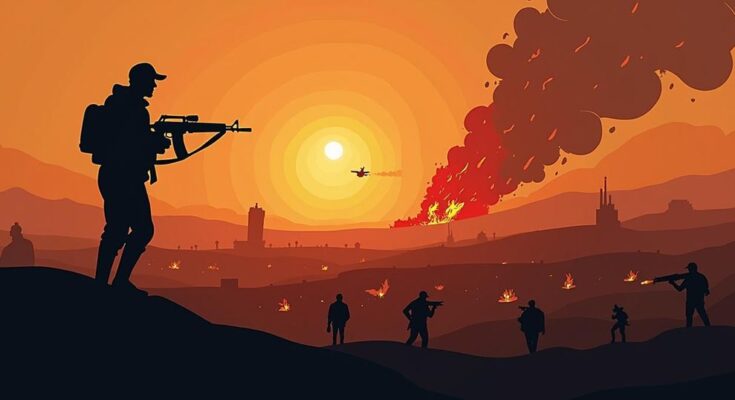The assassination of Hezbollah leader Hassan Nasrallah by Israeli airstrikes has heightened fears of a broader regional conflict. Israel’s military campaign against Hezbollah is centered around dismantling its capabilities amid an ongoing war with Hamas in Gaza. The situation has precipitated a humanitarian crisis in Lebanon, with numerous casualties and displacements, while analysts anticipate possible significant retaliations from Hezbollah and implications for Iranian involvement.
In recent days, the conflict between Israel and Hezbollah has escalated significantly following Israel’s airstrikes that resulted in the killing of Hezbollah leader Hassan Nasrallah in Beirut. This marked an important turning point in the ongoing hostilities since Hezbollah has been actively engaged in attacks against Israel amidst the larger context of the war with Hamas in Gaza. Israel’s military operations have targeted various sites across Lebanon, contributing to fears of an extensive regional conflict. With the death of Nasrallah, Hezbollah has experienced substantial losses, including multiple commanders, which raises concerns about the group’s operational capacity. Observers note that Israel has shifted its focus northward and has suggested the possibility of a ground invasion into Lebanon, which would mark the fourth such incursion in the last half-century. Moreover, the civil population in Lebanon has suffered greatly due to these hostilities; hundreds of thousands have been displaced, and the death toll has reached over a thousand since the recent bombings began. Israel has asserted that its strikes on Hezbollah targets have been aimed at dismantling the group’s capabilities, although the Lebanese government and civilians have criticized these airstrikes for their indiscriminate nature and adverse effects on non-combatants. In the aftermath of Nasrallah’s death, the remaining leaders of Hezbollah face urgent decisions regarding their next steps, particularly concerning retaliation. Analysts predict that the group’s response could prompt a significant escalation of hostilities, potentially leading toward a full-scale war. While Iran has historically supported Hezbollah, it remains cautious not to directly confront Israeli forces, as this could involve the United States more intensively. Iran’s officials have condemned Nasrallah’s killing as a serious provocation and have threatened to retaliate appropriately. Overall, the prospect for diplomacy appears bleak, with ongoing conflicts between Israel, Hezbollah, and Hamas unlikely to conclude soon. It is anticipated that managing these hostilities will necessitate significant strategic deterrence and possibly containment agreements, if both sides are amenable to such measures.
The article discusses the current state of conflict in the Middle East, focusing on the recent developments following Israeli airstrikes that killed Hezbollah leader Hassan Nasrallah. This event has intensified fears of a wider regional confrontation involving Iran and its proxies. The backdrop includes the ongoing war with Hamas in Gaza, which has seen increased military engagement from both Hezbollah and Israel. The situation remains complex with significant humanitarian consequences for civilians in Lebanon, alongside geopolitical ramifications.
In summary, the killing of Hassan Nasrallah by Israeli forces has escalated the conflict between Israel and Hezbollah, potentially paving the way for a more extensive military confrontation. The implications of this event raise critical questions about the immediate future of regional stability, the possible involvement of Iran, and the humanitarian crisis stemming from ongoing hostilities. Diplomatic solutions remain elusive as both sides navigate this precarious situation.
Original Source: www.cnn.com




